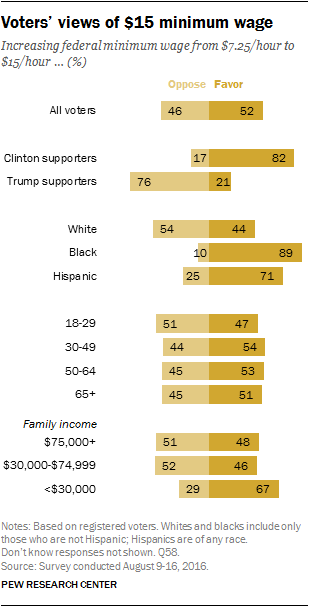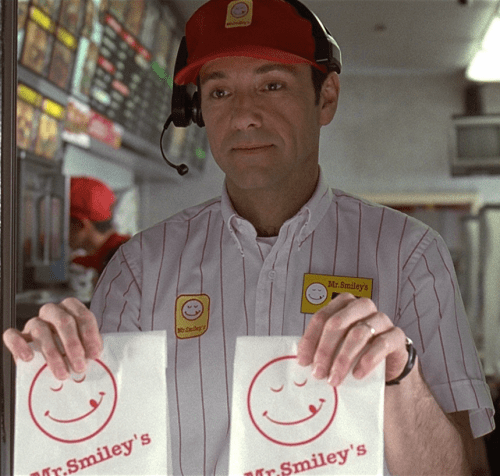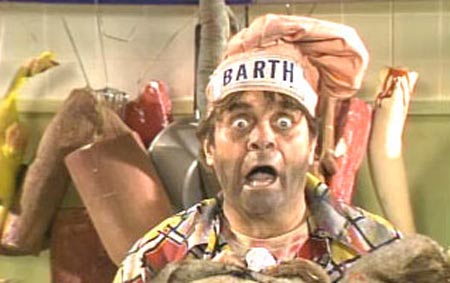Having majored in the so called “dismal science” known as economics, I will concede that much of economic theory must be prefaced by the statement “all things being equal.” Unless you are living in a cave, you’ll soon realize that nothing in this world is equal and for that matter, some caves are in fact better than others!
It is often difficult to apply economic theory to reality due to the simple complexity of life. And should you try it, you may end up like the anti-hero in the movie Pi, sitting alone in your apartment trying to connect insects to your computer 🙂
Despite the fact that nothing in this world is ever equal, I find that the minimum wage happens to be one of the more clear cut cases where economic theory is actually quite applicable to reality. As of this writing, the Democratic Party is beginning to line up its contenders for 2020 and at least one candidate, Bernie Sanders, has included a $15 minimum wage as part of his policy proposals. Considering the national attention this policy is now receiving, it’s worth exploring further.
From the research I’ve conducted, the minimum wage is a policy proposal that is grossly lopsided in terms of arguments. Although politics plays a role in the history of the minimum wage and has to be included in the discussion, it is not the purpose of this article. Instead, my intent is to lay out arguments against the minimum wage by providing not only sound economic theory but also empirical evidence to back it up.
The Argument in Favor of Raising The Minimum Wage
As I understand it, those who advocate for an increase in the minimum wage wish to protect those at the bottom of the income distribution pyramid, which are generally unskilled workers. Without a minimum wage law, business owners would be free to exploit their employees, forcing them to slave away for mere pennies while they reap nearly all the benefits. The law is sent in place to protect those honest workers would be deprived of the chance to move up in the world, being forever held in poverty with no means to escape.
By putting more money into the pockets of unskilled workers, the minimum wage also helps to stimulate the economy, since such funds otherwise wouldn’t be available. A final point is that due to ever rising costs, the minimum wage helps to ensure that a rising tide lifts all boats so that workers aren’t left behind by inflationary activity.

Basic Problems With Minimum Wage Theory
The fallacy with the argument outlined above is the assumption that workers are defenseless and unable to think for themselves, which is why they require a law to protect them from financial exploitation. To further see the weakness in such an argument, consider a basic example of a cashier who currently earns $5 per hour. Suddenly a new job opportunity opens up, offering $6 per hour. Now the cashier has some leverage, either by asking for the employer to match the competitor’s salary or to quite altogether and take the new job. Although my example is simple, these market forces are happening as we speak. As proof, simply visit a recruitment or job website, you’ll quickly be able to assess the potential salaries for nearly all positions in the economy. In short, market forces do quite well in terms of establishing wages, which is why you don’t require an outside force to set them.
Another problem with the minimum wage is that it is very difficult to apply a single base figure for a country as large as the United States, let alone a city or even small town; the value of labor is highly associated not only with skill but the type of work. Attempting to artificially determine what a proper wage should be across the board often leads to more harmful consequences than were intended.
Finally, an aspect of the employer / employee relationship that often goes overlooked by those who haven’t run businesses themselves, is that an employer only hires someone if they stand to make more money from their services. Some may argue that this such an act is exploitative, yet we never complain about sports figures or actors signing million dollar contracts. It’s very simple: a business owner, whether it’s a movie producer or the owner of a small restaurant who cannot eke out a profit from his staff won’t be in business very long. As you’ll see in the examples which follow, when the a wage is set too high, it can have a negative impact on aggregate employment. So without further ado, here are 4 reasons why the minimum wage causes more harm than good.

1.How Does Raising The Minimum Wage Affect Small Businesses? It Turns Out, The Minimum Wage Hurts Small Businesses the Most – The majority of businesses are not sitting on piles of cash, Apple being the exception, not the rule. This holds especially true for small businesses, which often do not turn a profit immediately. When we walk by a restaurant or a shop, we don’t see a summary of the balance sheet floating above the establishment. For this reason, many might be shocked to discover that their favorite local bar or coffee shop hasn’t ever turned a single dime of profit in years!
The majority of small business owners will have a basic idea of their costs before launching the venture and based on those projections will ultimately decide to go for it, or not. A minimum wage hike throws a monkey wrench into these projections, and in some cases it could be enough to shut down the business completely. Every penny counts in all businesses, but this is especially true for small ones; a wage increase of even a couple dollars could be enough to tip the scale for the owner, forcing them to throw in the towel.
Those who complain about giant retail corporations taking over America should be the most vocal opponents of the minimum wage since it only serves to drive a larger wedge between these corporate giants and the mom and pops. As will be evidenced in the points to follow, the minimum wage is the enemy of the “average Joe.”
2.The Minimum Wage Does Not Increase Job Growth – The intent of the minimum wage is to protect unskilled individuals by offering a living wage. In reality, when the minimum wage is applied, less opportunities open up for unskilled work, not more. A 30 year study of minimum wage laws in California by the Employment Policies Institute (EPI) concluded that “post minimum wage increases in California have caused a reduction in employment.”
What’s scary is that this study predicts further job losses in the hundreds of thousands, 400,000 to be exact, should California decide to further increase the minimum wage into 2022.
If this is not evidence enough, consider the findings of Mark Wilson’s paper titled The Negative Effects of Minimum Wage Laws: “Seventy years of empirical research generally finds that the higher the minimum wage increase is relative to the competitive wage level, the greater the loss in employment opportunities. A decision to increase the minimum wage is not cost-free; someone has to pay for it, and the research shows that low-skill youth pay for it by losing their jobs, while consumers may also pay for it with higher prices.” You may ask yourself why the minimum wage would cause less jobs to be created? Let’s examine the next point to understand why.
3. The Minimum Wage Does Not Help The Working Poor
A classic example of the negative effects of the minimum wage took place in New York City recently. After the minimum wage was raised to $15, car washers in the tri- state area found themselves out of work. As a result of the artificial spike in wages, the car wash owners could no longer keep the same number of staff, and in some cases decided to invest in machines, which would end up costing less down the road than continuing to employ the workers at the new levels.
It’s not just car washers, the $15 minimum wage increase was also a blow to fast food workers in New York City, where the wage hike has led to complaints of unfair firings and shift time being reduced per a recent New York Times article.Taking a more left leaning stance, the author shifts the blame on the business owners for their actions, overlooking the policy completely. What The Times fails to point out is the connection between the unfair firings and the minimum wage. Strangely enough, the true cause is actually in the title of the article: After Winning a $15 Minimum Wage, Fast Food Workers Now Battle Unfair Firings.
This fast food situation in New York City is a clear cut example of theory in action: when a non-market force attempts to dictate price, businesses will adapt accordingly. As mentioned previously, if a business owner cannot generate profit at $15 an hour, then it will be forced to reduce work hours or lay off staff, which is exactly what happened. The alternative is far worse, namely an accelerated push towards automation as we saw in the car wash example. The end result? Less jobs for those who need them the most. But it’s not just the unskilled workers who suffer from minimum wage policy, as you’ll see in my next point.
4. Raising The Minimum Wage Discourages Entrepreneurship – An artificial increase in minimum salaries could discourage the type of small businesses that have always been a part of American fabric. I wish to highlight that the small businesses which come to mind are the “mom and pop” type, such as your local pizza parlor, beauty salon, fruit vendor, or bar.
Although this example comes from Malaysia, the theory still holds. After a minimum wage hike in 2016 child care centers took a big hit: “Between 80% and 95% of the 5,421 registered centres likely to close down – no thanks to the rise in minimum wage…Operators could not raise their fees because parents would move their children to cheaper unlicensed centres or babysitters, putting the chlidren’s safety at risk.”
Why I’m Against the Minimum Wage
On the surface, arguing against the minimum wage puts you on the defensive since you’ll be attacked for being a shill for corporations or heartless. Such counterpoints, however, aren’t based on evidence and tend to be nothing more than personal attacks that don’t do much to examine the issue. Furthermore, since more than half of Americans support the minimum wage, it’s risky for politicians to fully take a stand against it.
The reason we continue to see the minimum wage implemented is that the idea sounds good on paper. Who wouldn’t vote for ensuring that the lowest skilled workers receive fair compensation? What’s not easy to do is examine the impact of the minimum wage on the economy, review academic journals, and deeply think about the impact of such a policy by applying basic economic theory.
The main reason I wish to share these findings is to advocate on behalf of the unskilled workers that the minimum wage ostensibly was set out to protect. What opportunities do those fast food workers in New York have available to them when nearly all the restaurants in their neighborhood are cutting hours? What about those car washers, where will they find work?
A final point I’ll make is that the appeal of America is to seek a better opportunity for future generations, it was probably a reason many Americans reading this are here today; one of their ancestors fled their home country for something better. Simply look at the plight of the Irish or Italians when they first entered the country and see how they are faring now. The point being that low skilled jobs have always been stepping stones to something bigger. The idea that someone would make a 30 year career as a McDonald’s cashier is an argument we’ve only been hearing recently.
Although we may not think $10 an hour is much, it’s still better than having nothing in your pocket because there are no jobs available, or even worse, being forced into the black market for work, where actual exploitation can and does occur. Those at the very bottom of the social pyramid have few options to begin with, the minimum wage often stripping them of one of them. If we truly are on the side of those who require the most assistance, we’ll take the time to examine the impacts of the minimum wage and strongly reconsider this policy.
I’m always open to changing my views. Do you agree? Disagree? Share your comments as I’m happy to further engage anyone on this subject.

Leave a Reply